In Zimbabwe, the United States Agency for International Development (USAID), and other international aid organizations in partnership with the Zimbabwe government have started a new alliance that will provide technical, vocational and entrepreneurial skills training to thousands of young Zimbabweans over the next three years. The project aims to ease unemployment and living conditions in the impoverished country.
USAID and the governments of Sweden and Britain have poured in $8 million to fund the economic prospects of Zimbabwe’s young people who finish tertiary education but do not get employment. This is called the Zimbabwe Works Phase One project.
Stephanie Funk, head of USAID in Zimbabwe, cited the country’s growing informal market as one of the reasons the program is so vital.
"As you know in Zimbabwe, there has been a shift from formal market to the informal market. Many people are earning a living through the informal market so learning about entrepreneurship is very important. USAID's goal is to end extreme poverty and one of the ways to do that is through economic development. That is why we are very excited about phase two where we will assist 22 500 young entrepreneurs in the next few years. Phase one began in 2012 and we assisted 8500 young entrepreneurs in Zimbabwe to do mentoring and teach them about entrepreneurship," said Funk.
Zimbabwe’s economy over the past 15 to 20 years has been in stagnation. The government says less than 10 percent of the more than 300,000 school graduates are absorbed by the Zimbabwean job market annually. Estimates put unemployment rates at about 80 percent. The government disputes that figure, saying even those in the informal sector must be considered employed.
Lisa Mashaka, 23, a banking and finance graduate, has not secured formal employment. But thanks to the Zimbabwe Works Phase One project, she is not that worried.
"So, I benefited exposure, networking, how to handle businesses, how to be an entrepreneur; how to manage finances. Now I know how to manage. That is how I benefited from Zimworks. Now I have finished my degree, I want to apply what I have learnt in school in my business. I am a caterer, but I am more of a personal caterer; for anniversaries, birthday parties [and] weddings," said Mashaka.
But with no foreseeable end to Zimbabwe’s economic decline, the entrepreneurs might one day fail to get people who want their services.
That might shift pressure to President Robert Mugabe’s government to embark on policies that can prop up the once vibrant Zimbabwe economy.
Zimbabwe’s agro-based economy plummeted when Harare embarked on a violent land reform program in the early 2000s, displacing white commercial farmers.
The country's economy has not yet fully recovered.




